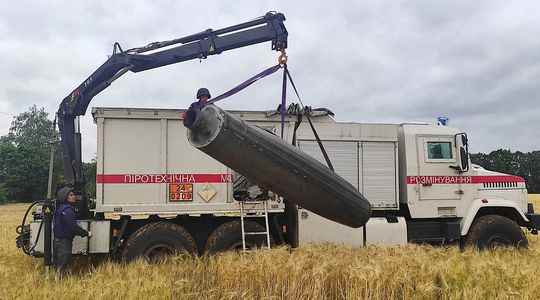The festivities lasted less than a day. Friday, an agreement was signed to guarantee the export of cereals in the Black Sea, while Ukraine and Russia together represent 30% of the world trade in wheat, the prices of which have exploded since the start of the war. But this Saturday, Russian missiles targeted Odessa, the main Ukrainian port. Two missiles were shot down by anti-aircraft defenses, but two others hit a grain processing plant, according to the Ukrainian military.
The attack was immediately condemned by the UN. Russia will assume “full responsibility” if the agreement on grain exports fails, kyiv reacted. The Kremlin “will play with the limits of the agreement, which is unfortunately not a ceasefire”, analyzes Carole Grimaud Potter, founder of the think tank Center for Russia and Eastern Europe Research (CREER) in Geneva.
L’Express: What do you think of this agreement?
Carole Grimaud Potter: We can only rejoice even if the situation remains fragile, as the strikes and the Ukrainian reaction underline it. Unblocking cereals would allow them to be sent to the countries that need them, especially in Africa. It would also free up space for new crops. Finally, Russia should resume its fertilizer exports. They are essential to prevent the yields of other producing countries from collapsing.
This is good news in terms of food, but also an interesting geopolitical signal. Even if the agreement provides for only 120 days of cooperation, it is renewable and shows that areas of agreement are possible So far, negotiations involving Ukraine and Russia have only rarely been successful. The Mariupol evacuation and prisoner exchanges were exceptions. There is now a major precedent which I hope will carry weight in future negotiations. Finally, it is a victory for Turkey. By snatching this agreement with the support of the UN, Recep Tayyip Erdogan is placing himself as an intermediary, with success.
Can he hold out while Russia continues to bombard Odessa, a strategic port for Ukrainian wheat?
The situation is particularly fragile. Several unknowns remain, beyond the details of the agreement which have not been disclosed. Boats will circulate in war zones. The operation is at risk, due to mines in the Black Sea and Sea of Azov. What will happen in the event of an accident? The two countries risk accusing each other. The slightest incident can serve as a pretext for withdrawing from the agreement.
The strikes in Odessa also show that Russia will play within the limits of the agreement, which unfortunately is not a ceasefire. Putin has pledged not to bomb Ukrainian ships in a specific Black Sea corridor and not to attack a few facilities in major ports, but the deal does not cover all of Ukraine’s grain infrastructure and ports. .. How will Ukraine react to the behavior of the Russians, who risk continuing to target the ports, even the fields and the grain silos? As we can see, the balance is uncertain.
The agreement should also release Russian fertilizers, another aggravating factor in the food crisis. Is this progress, at the cost of an easing of Western sanctions?
The blocking of Russian fertilizers does not seem to be directly due to the sanctions but rather to the reluctance of insurers and banks, who refused to guarantee these transports. This was stated by Turkey. This is also what the European Union says. Russia, on the other hand, maintains that Western sanctions on its banks are the cause of its export difficulties. The blur remains. No details on the Russian counterparties have yet filtered. However, the EU has said it is ready to unfreeze certain Russian assets, to facilitate transactions in wheat and fertilizers. The UN has also organized meetings with private companies and banks to reassure them. The institution promises to perpetuate these exchanges, with the creation of a dedicated team.
As it stands, can this agreement be enough to resolve the food crisis?
By acting on cereals and fertilizers, the agreement is a double blow for the food crisis: 25 million tonnes of wheat should be released if the situation holds. It is not negligible. But factors other than the availability of cereals are involved. The food crisis depends a lot on cereal prices. They have returned to pre-war prices, but remain extremely volatile. They could stabilize if the agreement holds but still it would be necessary that the future Ukrainian harvest is not too affected by the war…
